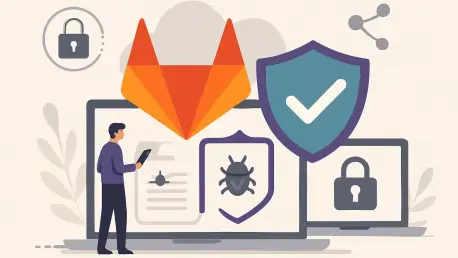In an era where cyber threats loom larger than ever, a single vulnerability can bring entire systems to a halt, disrupting workflows and compromising critical data across industries. GitLab, a cornerstone in the DevOps and version control landscape, has taken decisive action to counter such risks with a newly rolled-out security update targeting multiple denial-of-service (DoS) vulnerabilities. This patch addresses pressing flaws in both the Community Edition (CE) and Enterprise Edition (EE), urging administrators of self-managed instances to act swiftly. While users on GitLab.com are already shielded by the update, and GitLab Dedicated customers remain unaffected, the focus remains on ensuring that all deployments are fortified against potential exploits. This development underscores the ongoing battle against sophisticated attacks and highlights the importance of timely updates in maintaining system integrity.
Addressing Urgent Security Flaws
Unpacking High-Severity Threats
A closer examination of the update reveals two high-severity vulnerabilities that pose significant risks to GitLab instances if left unaddressed. The first, identified as CVE-2025-10004 with a CVSS 3.1 score of 7.5, enables unauthenticated attackers to incapacitate systems by exploiting GraphQL queries. These queries, when crafted to request oversized repository blobs, can trigger a DoS condition, effectively rendering the instance unusable. This flaw underscores the critical need for robust input validation and resource limits within such endpoints. GitLab has prioritized a fix for this issue in the latest versions—18.4.2, 18.3.4, and 18.2.8—ensuring that self-managed users can mitigate this threat by upgrading promptly. Beyond the immediate patch, this vulnerability serves as a reminder of how even seemingly minor oversights in query handling can have outsized impacts on system availability.
Another high-severity issue, tagged as CVE-2025-11340 with a CVSS score of 7.7, targets authorization flaws in GraphQL mutations specific to the Enterprise Edition. This vulnerability allows authenticated users wielding read-only tokens to perform unauthorized write operations, a breach that could lead to data manipulation or further system compromise. The implications of such a flaw are far-reaching, as they erode trust in access control mechanisms fundamental to secure operations. GitLab’s response in the update fortifies these mutations, closing the gap that permitted such actions. Administrators are encouraged to review token policies alongside the upgrade to prevent similar exploits, emphasizing that security is not just about patching but also about reinforcing foundational practices.
Medium-Severity Risks and Their Implications
Among the vulnerabilities addressed, two medium-severity issues also warrant attention for their potential to disrupt operations. CVE-2025-9825, with a CVSS score of 5.0, exposes sensitive CI/CD variables through the GraphQL API to unauthorized users, risking the leakage of critical configuration data. While not as immediately catastrophic as a full DoS attack, this flaw could provide attackers with insights needed to craft more targeted assaults. The update seals this exposure, ensuring that access to such variables aligns strictly with user permissions. For self-managed instance administrators, this fix is a call to audit API access controls and verify that sensitive information remains protected, highlighting how even medium-rated issues can escalate if exploited in tandem with other weaknesses.
The second medium-severity flaw, CVE-2025-2934, carrying a CVSS score of 4.3, affects webhook endpoints by allowing specially crafted HTTP responses to exhaust system resources, leading to a DoS state. This vulnerability illustrates the often-overlooked risks in external integrations, where malicious responses can strain infrastructure to the breaking point. GitLab’s patch in the latest release versions addresses this by enhancing resource handling during webhook interactions. Beyond applying the update, system administrators should consider implementing network isolation or throttling mechanisms to further safeguard against such resource-draining attacks. This issue reinforces the broader lesson that security must extend to every interaction point, no matter how peripheral it may seem.
Strengthening Defenses Through Best Practices
Proactive Security Measures
GitLab’s commitment to transparency and regular patching shines through in this update, as the company continues to publish detailed issue reports and maintain a public vulnerability tracker. This approach not only fosters trust but also equips users with the knowledge needed to stay ahead of emerging threats. The release of patches on a consistent schedule—specifically the second and fourth Wednesdays of each month—alongside ad-hoc critical updates, ensures that high-severity issues like these DoS vulnerabilities are addressed without delay. For self-managed users, adopting a routine of immediate upgrades to versions such as 18.4.2 or earlier supported releases is non-negotiable. Additionally, leveraging resources like the releases handbook provided by GitLab can streamline the process, ensuring that no critical step is overlooked in securing deployments.
Beyond updates, robust security practices form the bedrock of a resilient GitLab environment. Implementing strong access controls, managing tokens effectively to prevent misuse, and isolating networks where possible can significantly reduce the attack surface. These measures are particularly vital in light of flaws like unauthorized write operations or exposed CI/CD variables, where human error or lax policies can amplify risks. Administrators should also prioritize monitoring for unusual activity that might indicate exploitation attempts, especially in GraphQL or webhook interactions. By combining the technical fixes in this update with proactive governance, organizations can build a layered defense that not only addresses current vulnerabilities but also anticipates future challenges.
Moving Forward with Enhanced Vigilance
Reflecting on the rollout of this critical update, GitLab demonstrated a structured approach to tackling significant DoS vulnerabilities that could have disrupted countless systems. The detailed breakdown of severity ratings and specific CVE identifiers provided clarity for administrators, ensuring they understood the stakes involved. Patches for both high- and medium-severity flaws were deployed with precision, safeguarding GraphQL endpoints, webhook handling, and CI/CD authorizations. Looking ahead, the path forward involves not just applying these fixes but also embracing a mindset of continuous improvement. Regularly consulting GitLab’s security FAQ and staying updated on patch schedules will be key to maintaining system integrity. Moreover, fostering a culture of security awareness within teams can prevent lapses that might expose systems to similar threats, ensuring that the lessons from this update translate into lasting protection against an ever-evolving landscape of cyber risks.









